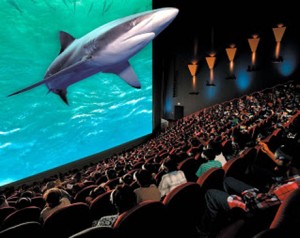
Prohibitions as viewed in one dimension
By Jasán Nieves Cárdenas
Seated comfortably, under the gelid effect of the air conditioning, and the sound coming from all directions along with tridimensional images, hundreds of Cubans have already enjoyed the experience of 3D movies.

Entrepreneurial spirits, egged on by economic openings in the country, caused the apparition of some 200 facilities of this kind all over Cuba. But these “theaters” are illegal, in the strict sense of the word. They are not authorized, but decision makers do not close them down.
This is happening in other cities and towns, because in provinces like Cienfuegos, where the law has been enforced in a stricter manner, not one of these theaters has yet to be inaugurated.
A Sunday October 27 story in the Cuban daily Juventud Rebelde focused on the existence of private audiovisual theaters that claimed authorization on licenses issued to “operators of equipment for the entertainment of children,” or as a service related to cafeterias, bars and restaurants.
But according to the deputy director of the Ministry of Labor in Cienfuegos, Leonel Alonso, these theaters “are illegal”, for there is no regulation under the standards for self-employment.
And since the standard is the law, and the Cienfuegos authorities have not been as flexible as their colleagues from other provinces, the eleven potential owners of small neighborhood theaters in Cienfuegos are still waiting.
The greatest concern voiced by the representatives of the government institutions in Sunday’s story is compliance with the country’s cultural policies in what those private theaters show. Most of the materials shown are movies with not much of a plot, but with plenty of special effects.
“We are not interested in limiting what is shown, but we want cultural products of a higher quality to be promoted,” said Vice Minister of Culture Fernando Rojas to Juventud Rebelde.
Wishful thinking, I would add, that should be accompanied by greater success in getting our national institutions themselves to comply with the principles of the enunciated policy, since one can not preach morality in his underwear, even less when what the private 3D theaters are showing is not much different from what we see on national TV.
In their declarations, officials said that “regulations are under study” for this recreational service, without additional detail – as is the usual custom. Our most recent history is full of examples whereby it would seem that some empowered officials wait for reality to adapt to regulations, and do not understand that it is necessary to adapt their thinking to the new demands already implanted.
In the light of these facts, I insist in believing that forbidding and persecuting will only lead to discontent and the elimination of an income-producer for Cubans who need to find peace in their pockets, or who attempt to scare away boredom during the hot nights in the neighborhoods.
Avoiding the growth of 3D theaters smells of smothering competition to favor cultural institutionalism, which has not been able to create or manage this service due to its almost inherent slowness in the face of social change, or due to its chronic lack of funding. If the question is to promote better films, the road for shaping this new market should be explicit dialogue, engaging and creating options.
But the alternative should never be, I think, a “diktat” because the effect of such conducts will further alienate consumers from officialdom and stimulate the alternative circulation of what is forbidden.
The necessary extension of authorizations for allowing owners of 3D theaters to contribute to society with their unique characteristics seems the sanest measure that could be taken. And taken quickly, for while they “analyze,” those who prefer to say no are still strong.
José Jasán Nieves is a radio man convinced of the incomparable beauty of a radio image.
(From the radio station Radio Ciudad del Mar, Cienfuegos, Cuba)

